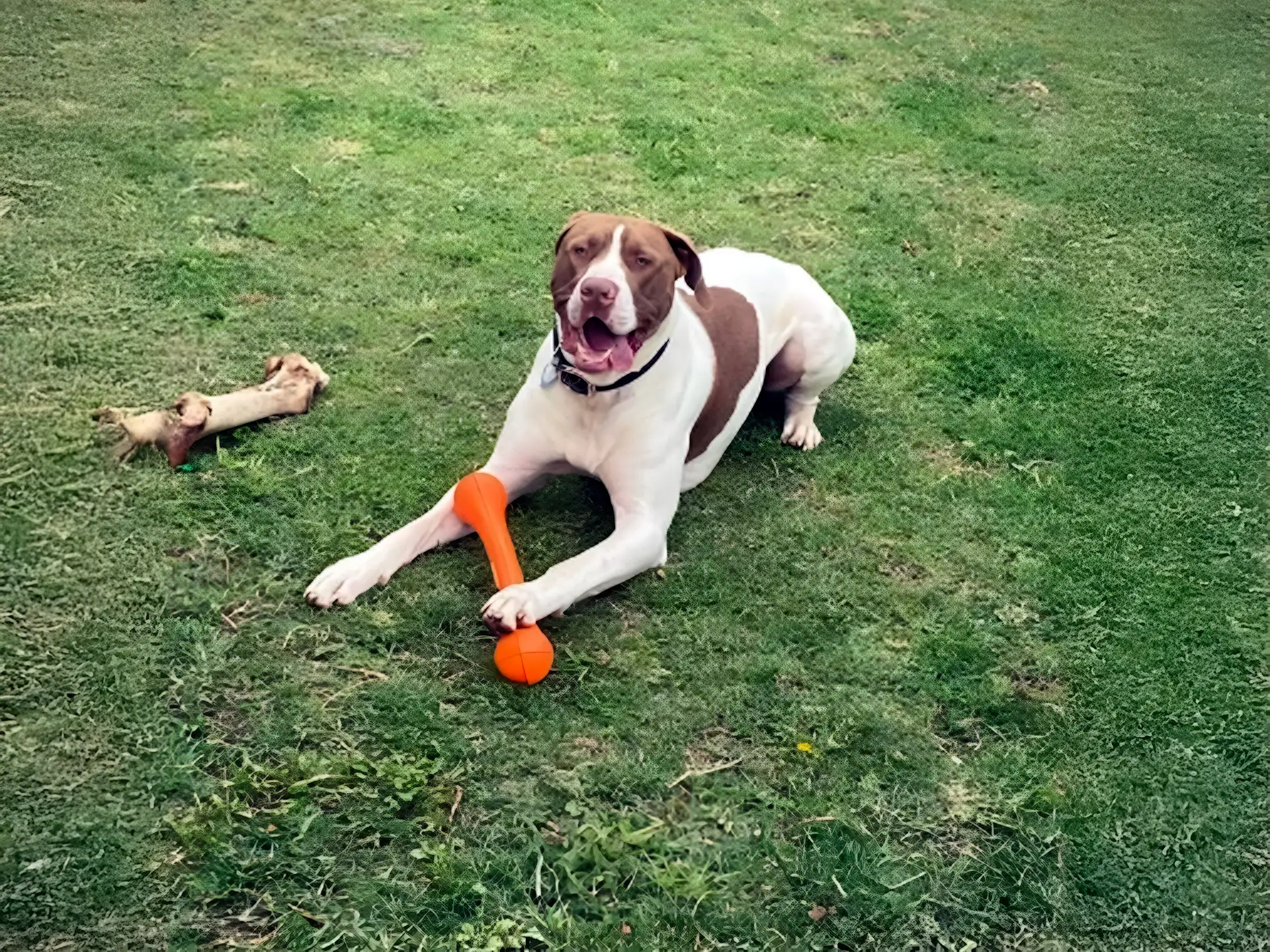Bull Arab Dog Breed Info & Overview
The Bull Arab is a strong and athletic breed originating from Australia, known for its exceptional hunting skills, particularly in tracking wild pigs. Combining the best traits of breeds like the Bull Terrier, Greyhound, and German Shorthaired Pointer, this versatile dog is celebrated for its intelligence, loyalty, and high energy levels.
Characteristics
Pictures
Breed History
The Bull Arab was developed in Australia during the 1970s by crossing Bull Terriers, Greyhounds, and German Shorthaired Pointers. The goal was to create the ultimate hunting dog capable of tracking and capturing feral pigs in the harsh Australian outback. This breed quickly gained popularity among hunters for its strength, agility, and keen sense of smell.
Mike Hodgens is credited with creating the Bull Arab by carefully selecting breeds that would contribute speed, endurance, and a strong prey drive. The Bull Terrier added tenacity, the Greyhound contributed speed, and the German Shorthaired Pointer offered tracking abilities. Over time, this mix resulted in a versatile and reliable hunting companion.
Although the Bull Arab is not recognized by major kennel clubs, it remains a cherished working dog in Australia. Its reputation as an exceptional hunter has kept it in demand among farmers and hunters alike. The breed’s history is deeply intertwined with Australia’s rural culture and the need for effective feral pig control.
Temperament, Personality
Bull Arabs are known for their loyal and affectionate nature towards their families. They form strong bonds with their owners and are eager to please, making them devoted companions. However, their protective instincts can make them wary of strangers, requiring early socialization to ensure they are well-adjusted around new people and environments.
This breed possesses high intelligence and energy levels, which means they need mental and physical stimulation to prevent boredom. Bull Arabs excel in activities that challenge them, such as obedience training and agility courses. Their keen senses and working background make them highly responsive to structured training sessions.
Due to their hunting heritage, Bull Arabs may have a strong prey drive. Caution is advised when introducing them to smaller pets like cats or rabbits. With proper training and socialization, they can coexist peacefully with other dogs. They are generally good with children but supervision is recommended due to their size and strength.
Physical Characteristics
The Bull Arab is a large, muscular dog with a strong, athletic build. Males typically stand between 24 and 27 inches tall, weighing 70 to 95 pounds. Their physique reflects their capabilities as powerful hunters, combining speed and strength to track and capture prey over varied terrain.
They have a short, smooth coat that comes in various colors, including white, black, brindle, and combinations with patches or spots. The coat is easy to maintain and provides adequate protection without hindering their agility. Their ears are medium-sized and can be either floppy or semi-erect, adding to their alert appearance.
Distinctive features include a broad head with a strong jaw, reflecting their Bull Terrier ancestry. Their eyes are usually brown and convey intelligence and focus. The tail is medium in length, tapering towards the end, and is carried low when relaxed. Overall, the Bull Arab’s physical traits are well-suited for their role as versatile working dogs.
Health Issues
Generally, the Bull Arab is considered a healthy breed with a robust constitution. However, like all breeds, they may be prone to certain health issues. Hip dysplasia is one condition to watch for, due to their size and activity levels. Regular veterinary check-ups and maintaining a healthy weight can help mitigate this risk.
Another potential concern is deafness, which can occur in dogs with a significant amount of white in their coat. It’s important for breeders to conduct hearing tests on puppies to ensure early detection. Eye problems such as entropion may also occur, although they are not widespread in the breed.
Parasite-borne diseases can be a risk, especially for dogs active in rural or bush areas. Regular preventative treatments for ticks, fleas, and worms are essential. Overall, providing a balanced diet, regular exercise, and routine veterinary care will help keep a Bull Arab in optimal health throughout their life.
Grooming Needs
The Bull Arab’s short coat is low-maintenance, requiring minimal grooming effort. Weekly brushing with a soft-bristle brush or grooming glove is sufficient to remove loose hairs and keep their coat shiny. This routine also helps distribute natural oils and promotes healthy skin.
Bathing is only necessary when the dog becomes particularly dirty or starts to develop an odor. Over-bathing can strip the coat of essential oils, so it’s best to keep it to a minimum. Using a mild dog shampoo will help maintain the coat’s condition without causing irritation.
Regularly checking and cleaning their ears is important to prevent infections, especially if the dog has floppy ears. Dental hygiene shouldn’t be overlooked; brushing their teeth several times a week can prevent tartar buildup. Nail trimming should be done monthly or as needed to keep them comfortable during activity.
Exercise Requirements
Given their high energy levels and working background, Bull Arabs require substantial daily exercise. At least one to two hours of vigorous activity is recommended to keep them physically fit and mentally stimulated. Activities can include long walks, jogging, or play sessions in a secure, fenced area.
Engaging in tasks that tap into their hunting instincts, such as tracking games or scent work, can be particularly fulfilling for this breed. Agility training and obedience competitions are also excellent ways to challenge their minds and bodies. Without adequate exercise, they may become bored and develop undesirable behaviors.
Owners should be prepared to provide not just physical activity but also mental engagement. Puzzle toys, interactive games, and training sessions can help keep a Bull Arab content. They thrive in environments where they have space to roam and explore, making them better suited to rural settings.
Training Tips
Bull Arabs are intelligent and eager to please, which generally makes training a rewarding experience. Consistency and positive reinforcement techniques work best. Early obedience training is crucial to establish boundaries and ensure they grow into well-mannered adults.
Due to their size and strength, it’s important to address any jumping or pulling behaviors from a young age. Socialization with different people, animals, and environments will help reduce any tendencies toward wariness or aggression. Introducing them to various situations can build their confidence and adaptability.
A firm but gentle approach is recommended, as harsh methods can lead to resistance or fearfulness. Incorporating play and rewards into training sessions can keep them engaged and motivated. Given their working heritage, they may excel in advanced training or specialized tasks like search and rescue.
Nutrition, Diet
Feeding a Bull Arab requires attention to their high energy needs and large size. A diet rich in high-quality proteins and balanced nutrients is essential. Typically, they require three to four cups of premium dry dog food per day, divided into two meals to prevent overeating and reduce the risk of bloat.
Portion sizes may vary depending on the dog’s age, activity level, and metabolism. Puppies have different nutritional needs than adults and should be fed puppy-specific formulas that support growth. Monitoring their weight and adjusting food intake accordingly will help maintain optimal body condition.
Consulting with a veterinarian can provide personalized dietary recommendations. Some Bull Arabs may benefit from diets that support joint health, including supplements like glucosamine and chondroitin. Fresh water should always be available, especially after exercise to keep them hydrated.
Adoption, Breeders
Those interested in owning a Bull Arab should seek out reputable breeders who prioritize health and temperament. In Australia, there are breeders who specialize in this breed and can provide insights into their care. It’s important to meet the breeder and, if possible, the puppy’s parents to assess their disposition.
Adoption is another avenue to consider. Rescue organizations and shelters occasionally have Bull Arabs or Bull Arab mixes in need of homes. Adopting an adult dog can be rewarding and may suit those looking for a companion without the challenges of raising a puppy.
Resources like the Bull Arab Rescue or local animal shelters can assist in finding a suitable dog. It’s crucial to ensure that the dog matches your lifestyle and that you are prepared for the responsibilities that come with owning this active breed.
Family Pet?
Bull Arabs can make excellent family pets for the right households. Their loyal and affectionate nature means they form strong bonds with family members. They are generally good with children, especially when raised together, but supervision is advised due to their size and strength.
Early socialization is key to ensuring they interact well with all family members and visitors. Teaching children how to respectfully interact with the dog will foster a positive relationship. The breed’s protective instincts can be an asset but may require management to prevent over-guarding behaviors.
Because of their high energy levels, Bull Arabs thrive in active families who can meet their exercise needs. They are less suited to apartment living and prefer homes with secure outdoor space. With the right environment and commitment, they can be loving and devoted family companions.
Right For You?
If you’re an active individual or family seeking a loyal and energetic companion, the Bull Arab might be the right fit. They require owners who are experienced with large breeds and can provide firm, consistent training. Ample exercise and mental stimulation are non-negotiable for this breed.
Those living in rural areas or with access to large outdoor spaces will find it easier to meet the Bull Arab’s needs. Their hunting instincts mean they excel in environments where they can use their natural abilities. Potential owners should be prepared for the responsibilities that come with such a high-energy dog.
Conversely, if you prefer a low-maintenance or sedentary pet, the Bull Arab may not be suitable. They are not ideal for first-time dog owners or those unable to commit time to training and exercise. Assessing your lifestyle and capabilities honestly will help determine if this breed aligns with your expectations.
Conclusion
The Bull Arab is a remarkable breed combining strength, intelligence, and loyalty. While they excel as working and hunting dogs, they can also be loving family companions for those prepared to meet their needs. With proper training, socialization, and care, the Bull Arab can be a rewarding addition to an active household.
FAQs
-
Are Bull Arabs good guard dogs?
Yes, Bull Arabs can make excellent guard dogs due to their protective instincts and alert nature. They are naturally wary of strangers and will often bark to alert their owners of unfamiliar presence, making them effective at safeguarding their home.
-
Do Bull Arabs get along with other dogs?
Bull Arabs can get along with other dogs if properly socialized from a young age. Early and consistent socialization helps them learn to interact positively. However, their strong prey drive may require supervision when introducing them to smaller dogs.
-
How much does a Bull Arab puppy cost?
The cost of a Bull Arab puppy can vary depending on the breeder, location, and lineage. On average, prices range from $500 to $1,000 AUD. It’s important to choose a reputable breeder who prioritizes health and temperament over profit.
-
Are Bull Arabs hypoallergenic?
No, Bull Arabs are not hypoallergenic. They have a short coat that sheds moderately, which can trigger allergies in sensitive individuals. Regular grooming can help minimize shedding, but those with allergies should consider hypoallergenic breeds.
-
What kind of jobs can Bull Arabs do?
Bull Arabs excel in roles that utilize their hunting and tracking abilities. They are often employed in feral pig control and can be trained for search and rescue operations. Their intelligence and agility also make them suitable for obedience and agility competitions.
Breed Ratings
The Bull Arab is intelligent and quick to learn, especially when training is consistent and engaging.
They enjoy playtime but may be more focused on work or tasks rather than constant play.
High energy levels mean they need plenty of physical activity to prevent boredom and restlessness.
Moderate shedding occurs, especially during seasonal changes; regular brushing can manage loose hairs.
Strong prey drive due to hunting background; caution needed around smaller animals.
Short coat requires minimal grooming; simple to maintain with occasional brushing and baths.
Responsive to training when positive reinforcement methods are used; consistency is key.
May experience separation anxiety if left alone for extended periods; prefers company.
Moderate barkers; may vocalize to alert owners or when excited.
Generally low droolers; not prone to excessive slobbering.
Can get along with other dogs if properly socialized; supervision recommended.
Generally healthy with few breed-specific issues; regular vet care ensures wellbeing.














